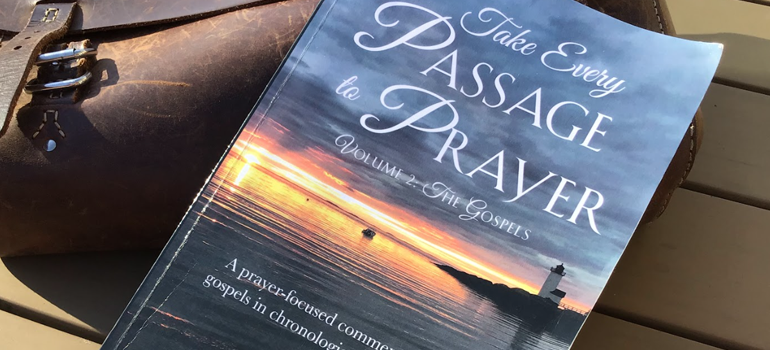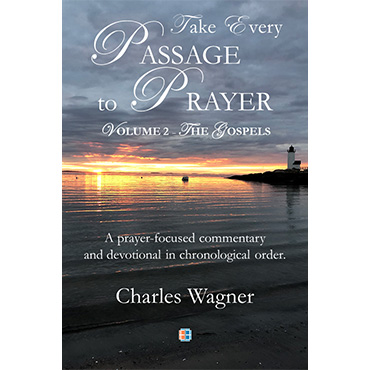The Gramazin Blog

Jesus in Jerusalem - Heals Paralytic at Pool
Take Every Passage to Prayer - Volume 2, The Gospels
Sunday June 23, 2024
John 5:1-47
Father, if there is anything about my character or my thought life that places more faith in a thing, a person, a place, a situation, or a circumstance more than I have faith in You, please forgive me. Help me to see where my idols are and please help me to let go of them. Father, I want to be healed by Jesus in every way that I need to be healed. I want my soul to be healed so that I will spend eternity with You. I want my character to be healed so that I reflect the character of Jesus in everything I do and speak. Father, if there is anything about me that clings on to weakness, brokenness, anxiety, or insecurity because I think it serves me, please help me to let go. I want to live for others from this point forward. Father, I want to be a man of mercy. I want to be a man of compassion. I want to be a man of empathy and kindness. Where I judge people according to the law, and it constrains me from loving them, please remove that spirit from me. Father, I don’t want to fear those who are judgmental of me. Instead, I want to have the courage to share the gospel with them from a spirit of compassion and mercy that is rooted in my desire to love those whom You love. Father, I believe that Jesus of Nazareth was, and is, the Son of God. I believe He proved His claim by the miracles He performed during His ministry on earth. Father, please help me to live my life knowing that it is Jesus who will be my judge on judgement day. I believe that my sins have been forgiven because the Jesus of Matthew, Mark, Luke, and John died on the cross for my sin, satisfying the justice that my crimes against You deserved. Amen.
Father, Jesus went to Jerusalem for a festival. Jerusalem was a walled city that had various gates. Just outside the Sheep Gate was a pool, surrounded by five colonnades (walkways lined with columns), called Bethesda. The people believed that this pool had healing powers, making it a destination for thousands of the sick and disabled, including the blind, the lame, and the paralyzed. Some manuscripts include a verse in this passage that tells us that there was widespread belief that the still water of the pool would suddenly start stirring, having been touched by an angel of the Lord. Whomever was the first person to step into the pool after the water had been agitated would experience total healing of whatever ailed them. Therefore, there was a competition for positioning along the perimeter of the pool. Given that people in the 21st century will camp overnight outside of a stadium to be the first to buy tickets for a major event, it is likely that people arrived in the dark of night to claim spaces at the edge of the pool. Those who were disabled were disadvantaged because they could not claim such spaces and, even if they did, they could not move fast enough to be the first into the pool.
This was the case for a man who had been disabled for 38 years. The text does not tell us if he was born disabled or if his disability was caused by an injury or a disease. He has been coming to this pool for a long time, hoping for miraculous healing while at the same time dealing with the reality that healing has never happened for him. How can it? He needs to be the first into the pool after the water is agitated and, with his condition, that is next to impossible for him.
Where are the friends of this paralyzed man? Why isn’t there someone, swift of foot, who will help this man be the first into the pool once the water is agitated?
- Is this an insensitive community? Do they lack empathy and compassion for others? Does no one notice this man by the pool, day after day, month after month, and year after year?
- Had this paralyzed man alienated his friends and family? Was he alone, perhaps due to a bitterness in his soul that few could connect with?
There are interesting details about this story that add intrigue.
- Nobody approached Jesus to ask Him to heal them. It was Jesus who approached the paralyzed man.
- Jesus did not announce His presence or offer the miraculous healing every person there wanted.
- Jesus did not teach or preach to the crowd.
- Jesus was able to walk through the crowd without causing a stir.
- John was the only one of the four gospel writers to share this story.
What are some of the things that I could conclude from this information?
- The people of Judea did not know about the healing Jesus had been doing 100 miles north in Galilee.
- The religious leaders in Jerusalem disparaged the rumors that Jesus of Nazareth is healing people. The propaganda had effectively cast doubt on the idea that any “mere man” can perform miracles.
- Jesus was not recognized by anyone at the pool. Had they known who He was, He would have been flocked with requests for healing.
- Jesus was recognized but His reputation had been so sullied that nobody wanted to approach Him.
- The people had heard about Jesus, and believed that He could heal, but there was nothing better for healing than the established “science” of healing in the waters of this pool.
- Jesus could read the minds of the crowd at the pool. It is a dismal reading as there was little to no faith among these urbanites. In the spirit of Isaiah 55:11, Jesus was not going to expend His effort on a crowd that was not ready for the gospel.
- John was alone with Jesus in this encounter with the paralyzed man. Peter, Andrew, and Philip most likely had also come to Jerusalem with Jesus. However, they were not present for this healing.
- The four disciples were present for this encounter with the paralyzed man. However, it was only John who felt this story was consequential. Perhaps the other disciples were of the belief that this was not a “mass miracle” event worthy of reporting on.
- For reasons known only to Him, Jesus chose to touch the life of just one person at the pool. He could have chosen a mass-miracle event that we would be reading about today in the gospel record. If this is true, Jesus came to the pool specifically to minister to this 38-year-old man whom Jesus already knew by name before they met.
The man was most likely distracted by the goings on in the pool when Jesus approached him. He may have had a good heart, rejoicing with those who were healed. He may have had a jealous heart, wishing it were he who was being healed. He may have been plotting how he could get to the pool and to be the first person in when the waters were agitated.
“Do you want to be made well?” Jesus asked him.
Father, people reading this chapter may respond to Jesus’ question with an “of course he does!” However, Jesus knew that not everyone who needs to heal wants to be healed. Millions of people through the centuries:
- Have relished in the role of “victim”. As long as they are victims, they will be cared for, and they will be the center of everyone’s attention.
- Have loved their addictions because they enjoy their addictive lifestyles.
- Have loved having problems because their problems give them an excuse for bad behavior and not giving their best to the service of others.
- Have loved their financial problems because they don’t have the work ethnic to work two jobs if necessary.
- Have refused to reconcile with and forgive others because of their pride.
- Have chosen to doubt that they will ever be healed instead of placing their faith in Christ’s healing powers.
- Have rejected spiritual healing because they love their rebellion from You.
Father, we can imply from Jesus’ asking this question that He will not heal those who do not want to be healed. Had this man stated, with integrity of heart, that he didn’t want to be healed, I believe Jesus would have left him paralyzed. How many of us have prayed for Jesus to do something for us that, the truth be told, we really don’t want Him to do?
“Father, make me a man of courage,” we pray. But then we cry out, “Father, take away this suffering I am experiencing. I can’t take it anymore. Why did You bring this into my life?” We didn’t really want the courage after all. Father, I believe Jesus knew that this paralyzed man’s heart genuinely wanted to be healed and that is why he was visited by Jesus by the pool.
The man’s paraphrased answer is “Yes! Since I have no one to help me, I have to try by myself every day to be first into the pool. I’m never first into the pool because someone always beats me into it. Why would I do that if I didn’t want to be healed?”
The text tells us that Jesus immediately healed him, saying “Get up! Pick up your mat and walk.” The man was immediately healed. He packed up his bed and walked.
Father, there are quite a few regulations in the Old Testament regarding the Sabbath. On the Sabbath:
- Exodus 16:29 people are to stay inside their homes.
- Exodus 20:10, 23:12; Leviticus 16:29, 23:3; Deuteronomy 5:14-15 people are not to work.
- Exodus 31:14-15 people who work on the Sabbath are to be cut off from the people and put to death.
- Exodus 35:3 people are not to light a fire on the Sabbath.
- Leviticus 16:31 people are to deny themselves.
- Numbers 15:32-36 people are not to gather wood or else they are to be put to death.
- Nehemiah 10:31 people are not to conduct business.
- Nehemiah 13:14-16 people are not to sell food.
- Jeremiah 17:21-22, 27 people are not to carry a load.
However, mankind has added far more Sabbath regulations than we found in the Old Testament. The Orthodox Union website lists the following activities that are prohibited on the Sabbath:
Carrying, burning, extinguishing, finishing, writing, erasing, cooking, washing, sewing, tearing, knotting, untying, shaping, plowing, planting, reaping, harvesting, threshing, winnowing, selecting, sifting, grinding, kneading, combing, spinning, dyeing, chain-stitching, warping, weaving, unraveling, building, demolishing, trapping, shearing, slaughtering, skinning, tanning, smoothing, and marking.
Using that list, let’s imagine someone with an injury on the Sabbath. To follow the letter of these laws, one cannot:
- Carry medical supplies to treat the victim.
- Write a prescription for medicine.
- Prepare a meal for the victim.
- Wash the victim’s bloody clothes.
- Stitch the victim’s wounds.
- Harvest fruit or vegetables that might nourish the victim.
Is this how Jesus views the Sabbath regulations? No. In Matthew 12, Jesus says:
- His disciples are allowed to pick grain on the Sabbath.
- Claims He is the “Lord of the Sabbath”.
- David was allowed to eat consecrated bread on the Sabbath.
- It is lawful to do good on the Sabbath, including rescuing an animal from a pit or helping a man with a shriveled hand.
- Jesus allowed His disciples to pick grain on the Sabbath (Matthew 12). In this same chapter, Jesus claims to be the “Lord of the Sabbath”.
We also learn that Jesus:
- Drove out demons on the Sabbath. Mark 1.
- Taught people on the Sabbath. Luke 4.
- Preached in the synagogue on the Sabbath. Mark 6.
- Healed a crippled woman on the Sabbath. Luke 13.
- Said circumcision was alright on the Sabbath. John 7.
What do we make of the Old Testament regulations that tell us not to work on the Sabbath but Jesus telling us we can show love to our neighbor on the Sabbath? Father, I believe it is this simple: the Sabbath is a day to focus on building Your Kingdom by loving our neighbors instead of focusing our energy on making a dollar for ourselves. It is a call to selflessness. Refusing to help somebody because of the Sabbath regulations is self-centeredness.
However, the Jewish leaders in Jerusalem caught up with the formerly paralyzed man and got on his case for carrying his mat on the Sabbath. They most likely threatened to stone him (Exodus 31:14-15) for such a heinous crime (Jeremiah 17:21-22, 27). In an effort to keep himself alive, the man quickly blamed his carrying the mat on Jesus.
“The man who healed me told me to carry my mat! It’s his fault! I was minding my own business and he came along and healed me.”
Father, this is what legalizers do. They rob us of our joy. A few minutes before, this man was celebrating being able to walk for the first time in 38 years. He had much to be thankful for. Along comes the legalizers and now this man is fearing for his life.
“Who was this man who healed you?”
“I don’t know. Some guy. I’ve never seen him before. And I don’t see him now. There are too many people here. He’s somewhere in the crowd.”
The man was excused by the “Gestapo”. These men didn’t know Your character, the One they claim to serve. Their god is a tyrant, a bully who is only concerned with rules and regulations. Their god has no mercy or compassion. There is no forgiveness with their god. They believe their god has given them the authority to dominate, threaten, and punish others, even with death. What more does the rebellious human heart long for than to be their own little god ruling maliciously over their submissive subjects? These wannabe deities no doubt had a laugh after the paralyzed man meekly walked away after he was excused.
Father, the text then tells us that Jesus found the paralyzed man in the temple. Hmmm. Could it be that Jesus knew this man had been interrogated by the morality police and his joy had been crushed? Could it be that Jesus, who loved him, sought him out to restore his joy? I think so.
Jesus said to him, “See, you are well again. Stop sinning or something worse may happen to you. (NIV)” A sermon can be preached from this one statement.
- Reflect upon the blessings that you have received from the Father. Be grateful and thankful. It will restore your joy.
- Dedicate your life to pleasing your Father in heaven who has shown His great love to you.
- If you do not surrender your life to Him, you may end up in eternal damnation.
The man, who I assume was filled with confidence and courage, looked for the Jewish leaders to tell them that it was Jesus who had made him well. He didn’t look for these leaders to explain who it was who told him to violate the Sabbath law. He looked for these leaders to explain to them why his joy had been restored. He was once more focused on the healing Jesus has brought into his life.
The text in the NIV tells us in verse 15 that the man “went away”, presumably from Jesus. In verse 16 we read that the Jewish leaders began to persecute Jesus. In verse 17 we read that Jesus defended Himself to these Jewish leaders against the charges. Therefore, the text is missing the detail as to how Jesus ended up in face-to-face conversation with the Jewish leaders. Did Jesus join the man as he returned to the Jewish leaders? Did Jesus subsequently seek out the Jewish leaders separately from the man? Or, did the Jewish leaders come searching for Jesus?
My choice, if I was asked to make one, is to believe that Jesus went with the man when he “went away” to find the Jewish leaders. It was Jesus very presence that had given this man courage to speak to the “Gestapo.” Father, when You are with us, no one can be against us (Romans 8:31).
The text tells us that Jewish leaders began to persecute Jesus because He “was doing these things”, meaning 1) He had dared to heal someone on the Sabbath; 2) He had told the man to carry His mat on the Sabbath; 3) He had lessened this man’s fear of them.
Jesus responded:
“My Father is always at His work to this very day, and I too am working (NIV).”
If this were a boxing match, Jesus just scored two direct hits to the face. First, He disarmed the Jewish leaders of their ability to stand in judgement over the population for what they do on the Sabbath. If the Father violates their Sabbath rules, how can they charge anyone with violating the Sabbath? Second, His statement made Himself equal to the Father. Jesus just declared Himself to be God and, therefore, He has the ultimate authority as to what can or can’t be done on the Sabbath. His statement had the same impact upon the Jewish leaders as would have happened if He had said, “You don’t have authority over the Sabbath. I do.”
The Jewish leaders were furious with Jesus and plotted His execution in their thoughts, thoughts that Jesus could clearly read. Jesus defended Himself throughout the remaining 29 verses of John 5.
Part 1 Jesus is the Judge of Mankind
- I follow the example the Father sets for Me. Everything that I do I first check if it is what the Father would want Me to do.
- The Father is eager to show Me what to do because the Father loves Me. The Father loves glorifying Himself by the things that I do. Look forward to more miracles coming from Me, including raising people from the dead because raising people from the dead is what the Father has shown Me how to do.
- You are here judging this man. The Father does not judge him. He has delegated the judgement of people to Me, His Son, the Son of Man. Just as the Father has authority over life or death, He has given me that authority as well. I do not judge this man for carrying a mat on the Sabbath.
- The Father wants Me to be honored just as He is honored. Those who do not honor Me do not honor the Father. How can you question Me and stand righteous before the Father?
- When I judge people, I do not grant eternal life for obedience to the rules of the Sabbath. Eternal life will be given to those who believe the Father sent Me to die for their sins.
- There will come a time when I speak, and the dead will hear My voice, and come before Me for judgement. For every soul has eternal life, including those who have done good (trusting in Me alone for their salvation) and those who have done bad (those who do not trust in Me alone for salvation). Those who do not place their faith in Me alone for their salvation will be condemned to eternal judgement.
- I judge souls in accordance with My desire to please My Father and the standard for justice set by Him. It is He who has determined that people will live or die eternally based on their acceptance of Me as their Savior.
Part 2 Evidence that Jesus has the Authority to Judge
- Do you question what I have said here? I know the law says I need witnesses. My testimony alone is not sufficient. (Deuteronomy 19:15)
- Do you question what I have said here? Listen to the testimony of John the Baptist about Me, though his testimony as a human isn’t My greatest defense. His words agree with what I have just said. He spoke the light of truth about Me in the darkness, and I know that you enjoyed his preaching. I want you to be saved just as much as he did. Please reflect on John the Baptist’s preaching.
- Do you question what I have said here? My greatest defense is the miracles I perform, demonstrating the compassion and mercy of the Father. Who can perform such miracles unless they are from the Father?
Part 3 Jesus Judges the Jewish Leaders
- You don’t know the Father and you don’t understand His Word because you don’t believe in Me. The Old Testament, which you claim to know so well, is all about My coming here to die for your sins. A man is not saved by his study of the Old Testament. He is saved by his belief that I have come to die for his sin.
- You refuse to believe that I have come to die for your sins. It is a choice you have made to deny yourself of eternal life.
- I don’t want your praise. I’m not looking for you to like me. Therefore, I can say that you do not have the love of God in your hearts. Where is your compassion? Your mercy? If you knew the Father, you would be loving to people like this man who was healed of his paralysis. You would be celebrating his healing, even on the Sabbath.
- You reject Me who has come from the Father. But I know you, in your foolishness, will embrace false prophets and false teachers to come. (2 Thessalonians 2:8-12)
- You reject Me because of your pride. You want to glorify yourselves and one another. The only glory that matters is the glory that comes from the Father given to those who believe in Me.
- I know. I know. Moses is the one whom you believe in. However, even he judges you because he wrote about Me. (Numbers 21:8-9, Leviticus 1-7)
Father, John does not conclude this conversation for us. The very next verse, John 6:1, says “Sometime after this, Jesus crossed to the far shore ” (NIV). We do not know how the Jewish leaders responded. Did Jesus’ words silence them? Did they turn and walk away? Did they humble themselves and seek Jesus’ forgiveness? Or did they seek Jesus’ persecution and death with even greater determination? Amen.
John does not tell us which festival it was. Festivals in the Old Testament include the Feast of Passover (Leviticus 23:5, Numbers 28:16, Deuteronomy 16:1), the Feast of Unleavened Bread (Exodus 23:15, Leviticus 23:6), Feast of First Fruits (Exodus 23:16, Leviticus 23:10, Numbers 29:26), the Feast of Weeks (also known as Pentecost, Exodus 34:22, Leviticus 23:15-16, Deuteronomy 16:9), the Feast of Trumpets (Leviticus 23:24, Numbers 29:1), the Feast of Atonement (Leviticus 16:3, 23:27, Numbers 29:7), the Feast of Tabernacles (also known as the Feast of Booths, Exodus 23:16, Leviticus 23:24, Numbers 29:12), or the Feast of Lots (also known as Purim, Esther 8:16-17, 9:19-32).
In the book of Nehemiah, we read that it was Nehemiah’s mission to rebuild the walls of Jerusalem and to repair the gates. The book references the Valley Gate, the Dung Gate, the Fountain Gate, the Fish Gate, the Jeshanah Gate, the Water Gate, the Horse Gate, the East Gate, the Inspection Gate, the Gate of Ephraim, and the Sheep Gate (3:1).
The Aramaic word ??????? for house of mercy, place of healing, or flowing water. The Greek word ??????? suggests the name was also Bethsaida. Archeologists unearthed this pool in the 19th century.
John 13:23-25 refers to a disciple whom Jesus loved. It is believed that John didn’t give us this disciple’s name out of humility, not wanting to say it was himself. It stands to reason, therefore, that Jesus and John spent time together, building their friendship, without the other disciples. Perhaps the fact that only John reported on this encounter at the pool hints to this.
Why was the taking up of the bed so important in this story? This was not just a healing. It was a lifestyle change. Never again will this man need to come to this pool for healing. His medical crisis is behind him. Jesus wants the transformation of our lives, not just the elimination of problems.
These verses in Jeremiah, that prohibit carrying a load, would seem to implicate the man who was healed by Jesus at the pool and carried his mat.
It is certainly not heretical to suggest that, even though the text does not state it, Jesus prayed before He healed the man of paralysis, asking for the Father’s help. Therefore, the Father was engaged in the healing of the paralytic man and, therefore, the Father was working on the Sabbath. Jesus followed the Father’s lead in doing work on the Sabbath.
There is clearly a disconnection of time and space between John 5:1-47 and John 6:1. In chapter 5, Jesus is in Jerusalem. In chapter 6, verse 1, Jesus is back up north, in the region of the Sea of Galilee. We are left with two possible explanations for this: 1) A significant time period, encompassing Jesus’ journey north to the region of Sea of Galilee, was not included in John’s gospel. The conclusion we must derive is that whatever Jesus did during this time was not worth mentioning. That seems unlikely. 2) John is not in perfect chronological order. A much older John, a senior citizen, is reflecting on events that occurred over fifty years before. While he has the details of the stories correct, he may not have the chronological order correct. Instead, John shares vignettes of Jesus ministry as he thinks of them. In this case, he thought of the healing of the paralytic at the pool in Jerusalem. The next memory that came to his mind was the time that Jesus fed the 5,000.







